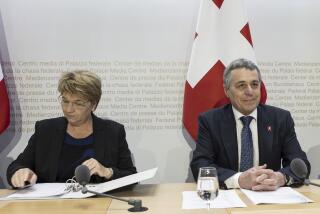Swiss Vote to Join U.N.
- Share via
PARIS — The Swiss voted Sunday to join the United Nations, moving their country warily but decisively closer to the international community after centuries of neutrality and independence.
The vote Sunday will make Switzerland the U.N.’s 190th member, leaving the Vatican as the only nonmember state with observer status.
The referendum to change the Swiss Constitution to allow U.N. entry won 56.4% of the ballots and carried 12 of 23 cantons, the Swiss equivalent of states--a close result that displayed the divisions created by the proposal in the Alpine nation of 7 million people. Approval required majorities of both the popular vote and the cantons.
Relieved Swiss leaders said the voters had put an end to an increasingly uncomfortable and paradoxical isolationism: Despite decades of resistance to joining the United Nations, Switzerland is home of the organization’s European headquarters, contributes to the U.N. budget and belongs to U.N. agencies such as the World Health Organization.
“I have communicated the intention of our country to join the United Nations by telephone to the organization’s secretary-general,” said Swiss Foreign Minister Joseph Deiss at a news conference in the capital, Bern, on Sunday. He added: “Switzerland remains a sovereign country, a neutral country and a strong country.”
The election was not exactly an overwhelming embrace of the United Nations, though it showed that Switzerland has changed considerably during the last decade and a half. In 1986, 75% of voters rejected a similar proposal.
Sunday’s vote and the campaign preceding it reflected continuing anti-U.N. sentiment that is prevalent in regions that are rural, eastern and German- and Italian-speaking.
Rightist and nationalist parties led by Christoph Blocher, a Zurich billionaire, warned voters during the campaign that their prosperous society would endanger its cherished commitment to neutrality by surrendering to the supposedly dangerous whims of the United States and other powers that dominate the U.N. Security Council. In recent weeks, the “No” campaign featured slogans such as “Yes to the Red Cross and Peace, No to the U.N. and War.”
The decision to join the U.N. “will unfortunately lead to a weakening of Switzerland,” Blocher said Sunday night after the results became clear. “It will have financial consequences for citizens. The freedoms of Swiss will be limited, and neutrality will be massively weakened. Unfortunately, it will have economic consequences as well, because foreign confidence in Switzerland will fall.”
By contrast, the financial establishment, the church, labor unions and other influential blocs had lobbied hard for the referendum. It was part of a larger trend--exemplified by a law enforcement crackdown on money laundering by foreign criminals in Swiss banks during the last decade--toward tempering traditional aloofness and promoting Switzerland’s role as a good global citizen. Switzerland’s image has suffered as a result of steadily isolationist votes rejecting proposals in recent years to join the European Union, U.N. peacekeeping forces and other international entities, analysts say.
Advocates of the referendum argued that the longtime rationale for Swiss abstention from membership faded after the end of the Cold War muted fears that Switzerland would have to take sides in an arena defined by conflict between East and West.
Moreover, Swiss leaders argued that the symbolism of participating as an unabashed member of the world community would bring tangible results.
“We will finally have the possibility of participating in the making of decisions and of defending directly our interests instead of depending on the goodwill of others,” said Jeno Staehelin, a diplomat.
More to Read
Sign up for Essential California
The most important California stories and recommendations in your inbox every morning.
You may occasionally receive promotional content from the Los Angeles Times.













